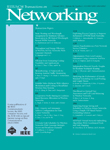
IEEE-ACM TRANSACTIONS ON NETWORKING
Scope & Guideline
Connecting Scholars through Cutting-Edge Networking Insights
Introduction
Aims and Scopes
- Network Protocols and Architectures:
The journal focuses on the design, analysis, and implementation of network protocols and architectures, exploring advancements in both wired and wireless communication systems. - Performance Evaluation and Optimization:
A significant emphasis is placed on methodologies for performance evaluation and optimization of networks, ensuring efficient resource utilization and enhanced Quality of Service (QoS). - Security and Privacy in Networking:
Research on security mechanisms and privacy-preserving techniques in networking systems is a core area, addressing vulnerabilities and proposing robust solutions to emerging threats. - Distributed and Edge Computing:
The journal covers topics related to distributed and edge computing, including resource management, data processing, and service provisioning in decentralized environments. - Emerging Technologies and Applications:
There is a consistent focus on novel networking technologies, such as IoT, blockchain, and quantum networking, with applications that span various industries and societal needs. - Machine Learning and AI in Networking:
The integration of machine learning and artificial intelligence techniques to enhance network management, optimization, and anomaly detection is a prominent theme.
Trending and Emerging
- Federated Learning and Edge Intelligence:
There is a surge in research related to federated learning and edge intelligence, highlighting the need for decentralized data processing and collaborative learning in resource-constrained environments. - Quantum Networking:
Emerging interest in quantum networking technologies is evident, with studies focusing on entanglement distribution, quantum security, and the integration of quantum protocols into existing networks. - Network Slicing and 5G Technologies:
Research on network slicing, particularly in the context of 5G, is trending as it enables flexible resource allocation and service differentiation in next-generation networks. - AI-Driven Network Management:
The application of artificial intelligence and machine learning techniques for intelligent network management and optimization is increasingly prevalent, reflecting a broader trend in the field. - Security Mechanisms for Emerging Networks:
As new technologies emerge, there is a growing focus on security mechanisms tailored for IoT, blockchain, and cloud environments, addressing unique vulnerabilities associated with these domains. - Data Privacy and Ethical Considerations:
Research on data privacy and ethical implications in networking, especially concerning user data in machine learning applications, is gaining importance as societal awareness increases.
Declining or Waning
- Traditional Network Management Approaches:
There has been a noticeable decrease in publications focused solely on traditional network management techniques, as the field shifts towards more dynamic, AI-driven approaches. - Legacy Protocols and Standards:
Research on older protocols and standards is becoming less frequent, with a growing preference for innovative protocols that cater to modern networking needs. - Static Network Architectures:
The exploration of static network architectures is declining, as the emphasis shifts towards more adaptable and flexible network designs that can accommodate changing demands. - Single-Technology Focus:
Papers centered around single-technology solutions are less common, reflecting a trend towards multi-technology integration and interoperability in networking. - Basic Theoretical Models:
There is a reduced focus on basic theoretical models that do not incorporate contemporary complexities, as researchers seek to address real-world challenges.
Similar Journals

Future Internet
Exploring the Frontiers of Digital CommunicationFuture Internet is a leading open-access journal published by MDPI, dedicated to advancing the field of Internet technologies and communication networks. Since its inception in 2009, the journal has provided a platform for rigorous research and innovative ideas in the context of the rapidly evolving digital landscape. Based in Switzerland, it has established itself as a prominent publication, earning a commendable Q2 ranking in the category of Computer Networks and Communications for 2023. With a Scopus ranking of #87/395 and a notable 78th percentile, Future Internet fosters interdisciplinary collaboration, making valuable contributions to the understanding of Internet systems, protocols, and applications. Researchers, professionals, and students alike will find a wealth of insightful articles addressing both theoretical foundations and practical implementations. The open-access format ensures that all readers have immediate and unrestricted access to high-quality research, facilitating knowledge dissemination and informed decision-making in academia and industry alike.

International Journal of Business Data Communications and Networking
Empowering Researchers in Business Data and Networking.The International Journal of Business Data Communications and Networking, published by IGI Global, stands as a pivotal resource in the fields of business and technology, particularly focusing on the interplay between data communications and network systems. With an established presence since 2005, this journal has been instrumental in disseminating research that bridges the gaps between computer networks, management information systems, and business practices. It holds a commendable position in the academic community, reflected in its Q3 rankings in both Computer Networks and Communications and Management Information Systems categories for 2023, alongside respectable Scopus rankings that underline its relevance and contribution to the field. While it operates on a subscription basis, the journal's commitment to quality research makes it an essential read for researchers, practitioners, and students eager to stay abreast of the latest developments and innovations. The journal aims to foster a deeper understanding of the complexities surrounding business communications and data networking, encouraging the advancement of knowledge and practical application in these ever-evolving domains.
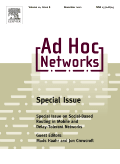
Ad Hoc Networks
Connecting Ideas, Empowering TechnologiesAd Hoc Networks, published by Elsevier, is a leading journal in the fields of Computer Networks and Communications, Hardware and Architecture, and Software, with an impressive Q1 ranking in all three categories as of 2023. With an ISSN of 1570-8705 and an E-ISSN of 1570-8713, this journal offers a robust platform for disseminating cutting-edge research and advancements in network technologies, emphasizing the importance of efficient communication protocols and architectures in contemporary computing environments. Operating from the Netherlands, it has emerged as a pivotal resource for researchers and professionals seeking to explore novel methodologies, frameworks, and applications within the domain of ad hoc and wireless networks. The journal's high impact factor and Scopus rankings—44th in Computer Networks and Communications, 20th in Hardware and Architecture, and 53rd in Software—underscore its relevance and authority in the academic community. Ad Hoc Networks is committed to fostering a deeper understanding of the complexities and innovations in network design, making it an essential read for anyone invested in the future of communication technology.
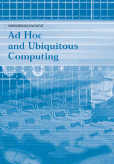
International Journal of Ad Hoc and Ubiquitous Computing
Advancing the Frontiers of Computing InnovationThe International Journal of Ad Hoc and Ubiquitous Computing, published by InderScience Enterprises Ltd, is a premier platform dedicated to advancing the fields of computer networks, communication systems, hardware, and software architecture. Since its inception in 2005, this journal has served as a critical resource for researchers, professionals, and students aiming to explore the intricate dynamics of ubiquitous computing and ad hoc networks. Though currently not an open-access journal, its scholarly contributions are well-recognized, as evidenced by its rank in the Scopus database, which places it within the lower quartiles of its respective categories. With an increasing focus on innovative solutions in computer science, the journal aims to facilitate knowledge dissemination and encourage interdisciplinary collaborations. Researchers are particularly drawn to the journal for its comprehensive coverage of emerging technologies, making it an invaluable asset in a world increasingly reliant on sophisticated communication infrastructures. As it continues to thrive towards 2024, the journal remains committed to fostering a vibrant academic community.

TELECOMMUNICATION SYSTEMS
Exploring the Future of Information SystemsTelecommunication Systems is a premier academic journal published by Springer, dedicated to advancing the field of telecommunications and information systems. With an ISSN of 1018-4864 and an E-ISSN of 1572-9451, this journal has established itself as a crucial resource in the realms of Electrical and Electronic Engineering, evidenced by its esteemed ranking in the Q2 category and a 70th percentile standing in Scopus ranks. Since its inception in 1993, it has provided an important platform for original research, innovative solutions, and theoretical developments in telecommunications technologies. The journal's objectives include fostering interdisciplinary collaboration and exploring the latest advancements in communication systems, making it essential reading for researchers, professionals, and students alike. With its commitment to quality and relevance, Telecommunication Systems remains at the forefront of scholarly communication in the dynamic telecommunications sector.

WIRELESS NETWORKS
Illuminating the Path of Wireless InnovationWIRELESS NETWORKS is a prestigious journal published by Springer, focusing on cutting-edge research in the domains of wireless communication, computer networks, and information systems. Established in 1995 and set to converge its influential contributions until 2024, this journal has rapidly ascended to a Q2 category ranking in the fields of Computer Networks and Communications, Electrical and Electronic Engineering, and Information Systems, reflecting its significant role in advancing knowledge and innovation—ranked 75th, 151st, and 84th respectively in their fields by Scopus. Researchers and professionals alike value its contribution to the discourse on wireless technologies, making it a vital resource for professionals and students eager to stay abreast of the latest trends and findings. Although it does not offer open access, the insights gleaned from its articles are invaluable for tackling the challenges of modern communications and ensuring the efficient use of wireless networks.

International Journal of Networked and Distributed Computing
Fostering Collaboration in Computing ResearchWelcome to the International Journal of Networked and Distributed Computing, published by SpringerNature, a premier outlet for cutting-edge research in the realms of computer networks and distributed computing systems. Established as an Open Access journal since 2013 and based in the Netherlands, this publication strives to disseminate high-quality, peer-reviewed studies that address the complexities of contemporary computing challenges. With an impact factor that reflects its growing influence—positioned in the Q3 category for both Computer Networks and Communications and Computer Science Applications—this journal serves as a pivotal resource for scholars and practitioners aiming to advance knowledge and innovation in this rapidly evolving field. The journal encompasses diverse topics, from network protocols to distributed algorithms, ensuring that researchers, professionals, and students can find relevant insights and methodologies to inform their work. Join us in exploring the depths of networked and distributed computing, contributing to a collaborative academic environment that shapes the future of technology.
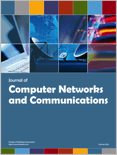
Journal of Computer Networks and Communications
Bridging Theory and Practice in Networking SolutionsThe Journal of Computer Networks and Communications is a premier open-access journal published by HINDAWI LTD, dedicated to advancing the field of computer networks and communications. With an ISSN of 2090-7141 and an E-ISSN of 2090-715X, this journal has been accessible to researchers since its inception in 2011, promoting widespread dissemination of knowledge in this rapidly evolving discipline. Based in Egypt, the journal's editorial standards are upheld through a rigorous peer-review process, contributing to its strong academic reputation. As of 2023, it holds a commendable Q2 ranking in Computer Networks and Communications and a Q3 ranking in Information Systems within its category quartiles. According to Scopus rankings, it occupies the 141st and 143rd positions in its respective fields, showcasing its relevance and influence in the academic community. The journal's mission is to publish high-quality research that addresses contemporary challenges in networking technologies and systems, making it an essential resource for researchers, professionals, and students seeking to innovate and excel in these fields.
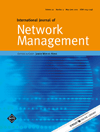
International Journal of Network Management
Advancing Knowledge in Network Management Excellence.The International Journal of Network Management, published by WILEY, has been an authoritative resource in the field of network management since its inception in 1991. With a strong academic reputation reflected in its 2023 category quartiles placing it in Q2 for both Computer Networks and Communications and Computer Science Applications, this journal is ranked within the top tiers of its categories, underscoring its pivotal role in disseminating high-quality research. The journal aims to provide insights into the latest advancements in network management strategies, technologies, and applications, catering to the needs of researchers, professionals, and students alike. By embracing rigorous peer-review processes and a commitment to publishing cutting-edge studies, it serves as a crucial platform for the exchange of knowledge and innovation within the network management community. Explore the wealth of resources and join the dialogue among a diverse audience striving to shape the future of computer networks and applications.

PERFORMANCE EVALUATION
Bridging Theory and Practice in Performance ResearchPERFORMANCE EVALUATION, published by ELSEVIER, is a prestigious journal that serves as a critical resource for researchers and professionals in the fields of Computer Networks and Communications, Hardware and Architecture, Modeling and Simulation, and Software. With its ISSN 0166-5316 and E-ISSN 1872-745X, this journal is recognized for its contribution to the advancement of performance assessment methodologies and empirical research. Holding a Q3 quartile ranking across multiple categories in 2023, PERFORMANCE EVALUATION is positioned as a valuable platform for disseminating high-quality studies that explore complex performance issues and innovative solutions. Operating from its base in the Netherlands, this journal emphasizes rigorous peer-review standards and enhances its relevance within the academic community by addressing crucial challenges and trends in technology. Stakeholders can access the wealth of knowledge published from 1981 through 2024 by exploring this journal, making it an essential tool for practitioners and scholars aiming to stay at the forefront of computer science research.